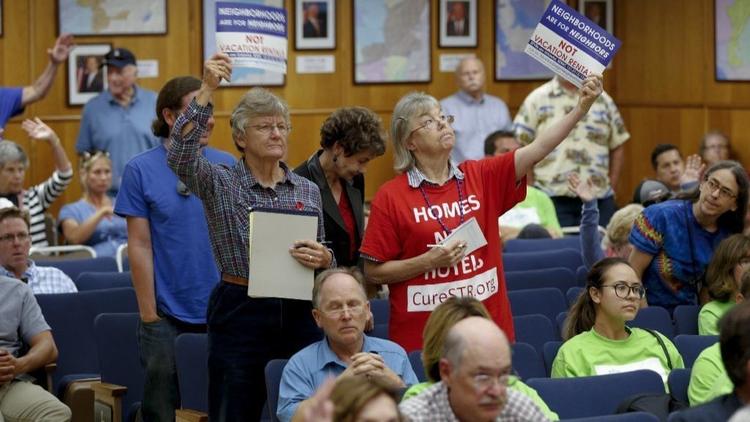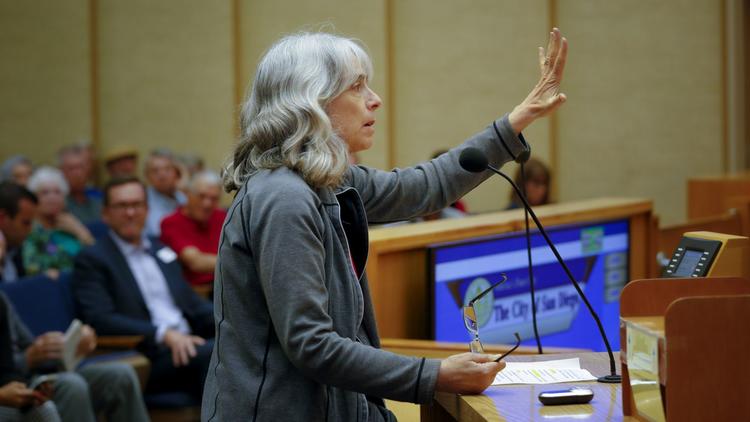7777 Alvarado Rd #700
La Mesa, CA 91942

San Diego City Council Votes to Limit Airbnb Rentals

In a move that will dramatically alter San Diego’s home sharing landscape, the City Council Monday voted to outlaw vacation rentals in secondary homes, limiting short-term stays to one’s primary residence only.
The effect of the action will be to curtail investor activity in the short-term rental market while also barring residents and out-of-towners from hosting short-term stays in multiple properties other than where they reside.
While the council was expected to weigh a special exemption for longstanding Mission Beach vacation rentals that already had paid required transient occupancy taxes, a council majority was not willing to go along with that. Roughly 44 percent of the housing stock in Mission Beach, long a popular destination for vacationers, is estimated to be short-term rentals.
The council vote was 6 to 3, with council members Scott Sherman, David Alvarez and Chris Cate dissenting.
One exception was made for San Diegans who have additional units on the same property as their residence, as in a duplex. In those instances only, a resident would be able to get a license for a second vacation rental. While not part of Monday’s action, council members said they would like to revisit the issue of granny flats, which under current rules, could not be used for vacation rentals.
The crackdown on Airbnb-style rentals has the potential to affect as many as 80 percent of the city’s more than 11,000 vacation rentals, estimated Elyse Lowe, the mayor’s director of land use and economic development policy.
“Today’s vote by the San Diego City Council is an affront to thousands of responsible, hard-working San Diegans and will result in millions of dollars in lost tax revenue for the City,” Airbnb said in a statement to the U-T. “San Diego has been a vacation rental destination for nearly 100 years and today’s vote all but ensures activity will be forced underground and guests will choose alternative destinations.”
The action, following a more than six-hour-long, sometimes emotional hearing, marks a striking departure from the centerpiece of a compromise proposal crafted by Mayor Kevin Faulconer’s office over the last several months in response to multiple failed efforts by council members over the last three years to legalize rentals popularized by Airbnb.
His plan would have permitted vacation rental hosts to rent out their primary residences while they are not present for up to six months a year — plus one additional home with no limit on the number of days annually. The council-approved plan, led by Coucilwomen Barbara Bry and Lorie Zapf, would still limit short-term rentals of one’s primary home to six months.
the small details make a huge difference in a homes selling price
find out what you can do to get the most from your property.
While Faulconer’s effort at a compromise was more restrictive than a proposal floated late last year by four council members, pressure has been increasingly building in recent weeks from the hard hit beach communities, as well as from organized labor and the California hotel lodging industry association, which had lobbied hard to get the city to rein in vacation rentals.
The new regulations, which will govern the renting out of rooms while the host is present, as well as an entire home when the resident is not present, will go into effect by July of 2019.
“I wasn’t elected to serve the interests of out-of-town investors but our District 2 constituents who have spoken for years of abuses of short term rentals in their neighborhoods,” said Zapf, who represents many of the beach communities. “Our neighborhoods should not be treated like a game of Monopoly … while our long-term residents suffer. This is by no means the ideal solution but it’s as close as we’ve gotten to getting some relief.”
In another dramatic change, the council decided to not exempt Mission Beach, long a haven for vacation rentals, from the citywide regulations, as Faulconer had originally proposed. Earlier in the day, the mayor had released a memo saying he no longer favored allowing unlimited rentals in the community but did support grandfathering in existing rentals that had paid the required transient occupancy tax to the city.
According to Lowe, there are about 1,100 short-term rentals in Mission Beach that have registered to pay the city’s room tax. It’s not clear how many of those are primary residences.
Gary Wonacott, Mission Beach Town Council president, was happy with the council vote, having fought for years for tighter regulations.
“It’s pretty emotional, really,” Wonacott said, his voice breaking for a moment. “We get our community back … I think this gives us a chance to get some young families back in.”
While a number of changes were made to Faulconer’s multi-pronged approach to regulating the proliferation of vacation rentals, he said he was pleased that it helped finally yield concrete action from the council.
“I introduced my compromise proposal to help the City Council find enough common ground so they could pass comprehensive short-term rental laws, and with the additional amendments made today we’ve finally achieved that goal,” Faulconer said in a statement. “As I’ve said repeatedly, the most important thing is that we have an established set of rules that protects neighborhood quality of life through increased oversight and enforcement,” Faulconer said in a statement.
Despite the change in who will be allowed to host vacation rentals, several other parts of Faulconer’s framework for regulations remained, including the imposition of three-night minimum stays in the more saturated coastal areas and downtown San Diego. In addition, all short-term rentals of entire homes will be subject to a steep licensing fee of $949 annually — believed to be the highest in the country. The revenues will be used to fund new code enforcement positions in multiple departments, although with fewer short term rentals that would be paying the fee, the calculation may have to be readjusted.
Short-term rental hosts will also have to pay an affordable housing fee of $3.96 for whole-home rentals and $2.73 for those renting out a room in their home while they are present.
In a move to crack down even further on short-term rentals, the council added a provision that will require a more onerous permit process for homes with four or more bedrooms.
The new regulations also are designed to require compliance by the online platforms themselves, who would be subject to stiff penalties for failing to help ensure their hosts are registered.
Councilman Chris Cate, who has long favored a more permissive approach, said after the hearing he is worried about whether it can withstand legal challenge
“I am deeply disappointed in the proposal adopted by the Council relating to short-term rentals,” he said on Twitter. “After nearly four years of debate and discussion, a reasonable compromise was before us that would balance neighborhood protections with our thriving tourism economy. Instead, the Council chose a path that is not only unenforceable and subject to legal challenge, but would drive the activity underground, resulting in the loss in millions of dollars in revenue that funds public safety officers and the repairing of city streets.”
The California Coastal Commission, which has long supported vacation rentals as an affordable alternative to pricier hotel stays along the coast, will also have to weigh in. Last week the commission sent a letter to council members reminding them of the importance of the role such rentals play in ensuring affordable access to the coast.
Former San Diego City Attorney Jan Goldsmith, who appeared at the hearing on behalf of Airbnb and HomeAway, warned that legal challenges could follow. So, too, did Jonah Mechanic, who runs a vacation rental company and is president of Share San Diego, a group supporting more permissive rules governing vacation rentals.
He said the vote was “made on feelings, propaganda and fear-mongering and not on facts” and predicted the new rules will be challenged in court.
In the decade since Airbnb popularized the home sharing industry, San Diego’s estimated inventory of vacation rentals has grown to more than 11,000, the majority of which are entire homes that are being rented out for short-term stays, according to the data analytics firm Host Compliance
In taking the action it did on Monday, the council is following the lead of other big cities, like San Francisco, New York and Paris, which, too, have limited short-term rentals to residents’ primary homes.
Pressure has been building to take some action for several years amid complaints from residents that rotating cycles of vacationers are disrupting their quiet neighborhoods and depleting the supply of long-term housing. Vacation rental hosts counter that their tenants have been a boon to the economy and that platforms like Airbnb and HomeAway provide them extra revenue to help meet their financial obligations.
Councilwoman Bry predicted that the new rules will be defensible in court and still provide an avenue for extra income for residents.
“This is a great day for San Diego because we passed an ordinance that will protect our precious housing stock and still allow people to do home-sharing to make ends meet,” she said minutes after the council session ended. “This is not a ban. This allows home-sharing and this allows someone to rent out their whole house on a short term basis up to six months a year. This is the original spirit of Airbnb.”.

Jefi is a La Mesa Real Estate Agent at THRiVE Real Estate. She has years of experience working with buyers and sellers throughout San Diego. Consider contacting Jefi for your next real estate transaction.

